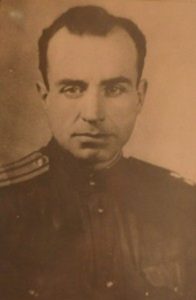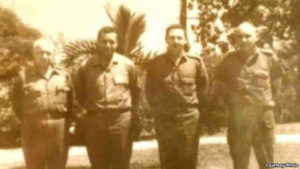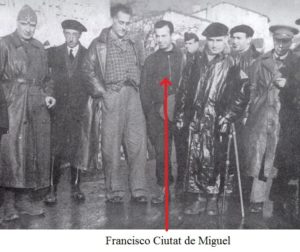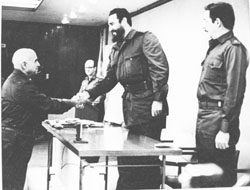![]() This real story took place in the evening of March 4, 1960. A plane, from Curaçao, touched Cuban soil. It travels a man, old man of strong build, low stature, little hair and greying. His deeply expressive blue eyes draw attention to. Over and over again customs staff check passports and requisition bags and suitcases. It comes from the Soviet Union, and became Czechoslovakia and Belgium. For reasons that very few know about conceals his real name under the personality of a small merchant’s tobacco, hence the required scales that have been bringing it safely to Cuba.
This real story took place in the evening of March 4, 1960. A plane, from Curaçao, touched Cuban soil. It travels a man, old man of strong build, low stature, little hair and greying. His deeply expressive blue eyes draw attention to. Over and over again customs staff check passports and requisition bags and suitcases. It comes from the Soviet Union, and became Czechoslovakia and Belgium. For reasons that very few know about conceals his real name under the personality of a small merchant’s tobacco, hence the required scales that have been bringing it safely to Cuba.
Calm, he decides to leave as soon as possible the air terminal. Where to contact? The best will be to hire a taxi to the city. He walks fast, almost with agility Marathon. Pack: few garments, a case with cigars and $50. Without realizing, someone follows you…
-Hear, hear, stop please!
The newcomer to dry. It has a presentiment that it is him, and turns with equal abruptness.
-Do not look back and go up to the machine, the driver knows where to take it.
Who is it really? What what it brings to the turbulent stage of Cuba in revolutionary effervescence? Who and where are you?
Francisco Ciutat de Miguel is his given name, but friends and family call you Paco. Fidel Castro to address it fit you an alias, Comrade “Ángel”, as his father Spanish, Angel Castro. In his tour of Cuba “Ángel” marries the Russian Soviet Sofia Kokuina, the wife with whom he joined two years after their arrival to the island of Cuba.
Who really is the Comrade “Angel”?.
Who was the man who called him out of the airport?
Flavio Bravo, Communist of row that led him to the House of the militant also, Secundino Guerra. 6 or 7 presented him to Che, and a few days later, like 10 or 11, to Raul, who came to become Adviser, as from 16 years already Paco studying at military colleges. When the uprising led by the fateful general Francisco Franco against the Republic, he held the rank of Lieutenant Colonel of the Spanish Popular Army.
According with the ones who knew him despite his Warrior training, sweetness characterized it, he spoke very quietly, always very loving;» never shouted, not to give an order to his subordinates. If not for the uniform, anyone would think that it was a grizzled strategist of two large military strife, because Paco also fought in the USSR during the great patriotic war.
“Paco” or “Angel” liked physical exercise. Despite its complexion, Paco was very light. This readiness was that allowed him to address, in just seconds, the last ship that lost the Republic, spreading quickly from the dock, bow to England, crowded of migrants, children, young, old, men, women, soldiers, militiamen…
His work in Cuba.
He arrived at Cuba at the time and was differentiated between about ten Spaniards who were members of the Group of soldiers that the Soviet Communist Party sent to the island (March 1960), this group of Military Academy arrived as consultants.
According to the opinion of some of the Cuban revolutionary commanders are you distinguished addition “as this exceptional man who led to the FAR modern organization and the military strategy. It had the virtue of teaching the way, the first steps in this task, in that important undertaking was the creation and organization of the armed forces of new type. One of that most stood out, by his experience, by his brilliance, for their knowledge, for permanent allegiance to the revolutionary cause, by such close identification accomplished among our principal chiefs, including fellow Fidel and Raul. And to all this contributed greatly its quality as a human being, his great general and military culture, and loyalty specifically, to the Cuban revolution. Soviet military chose it to be shipped to Cuba also because it met all the conditions, even spoke the same language. In particular: needed advice to form large packs and their staffs, army, divisions, anti-aircraft, Navy, administration centers, training of the personnel capable of assimilating the new combative technique. And they were these companions, veterans, the first who helped us. Our army lacked military skills.
And continue Belarmino Castilla, one of the Cuban commanders that developed a close relationship with the Russian comrade… “Along with the Commander of the revolution Juan Almeida Bosque, Angelito founded the Central army.” Here his work was not limited only to the instruction and advice. It drew in the Escambray and took part in several actions, until he falls wounded in combat. The bullet is embedded it in a foot, limped for quite some time. Also fulfilled various missions, including in Algeria, when the referendum with Morocco, and Viet Nam. “The war in the latter country-style us was vital, a strategic objective, a school which today can be summarized in the concept of war of all the people”.
And continues “was a man who did not hesitate at any time to move back to his homeland to continue to fight for his people from the ranks of the Communist Party Spanish, whose Central Committee belonged.” “Only a cruel disease, when already physically it was impossible to continue, and the persistence of the own Commander in Chief, could make it back to Cuba”.
-After that Franco died and they legalized the Spanish Communist Party, in 1977, to April 8, 1985, when he became ill. They gave the order of Playa Giron is in the hospital. Until the CIMEQ were Fidel and Raul. I wanted to die in Cuba and here died, on November 30, 1986. He is buried in the Pantheon of the FAR.
-With what names are you remember more?
A man like comrade “Ángel” can be called in any way, in this case Francisco Ciutat de Miguel, his true name; Pavel Pavlovich Stepanov, his Russian patronymic, or Angel Martínez Riosola as well as it was known in Spain.
Agencies/DentrodelCafetal/Mercedes Rodriguez/Excerpts/ Internet Photos / Arnoldo Varona / TheCubanHistory.com
THE CUBAN HISTORY, HOLLYWOOD.
![]() SE LE LLAMABA EL CAMARADA “ÁNGEL” (EN CUBA), “PAVEL” (EN RUSIA) o “PACO” EN ESPAÑA.
SE LE LLAMABA EL CAMARADA “ÁNGEL” (EN CUBA), “PAVEL” (EN RUSIA) o “PACO” EN ESPAÑA.
Transcurre la tarde del 4 de marzo de 1960. Un avión, procedente de Curazao, toca tierra cubana. En él viaja un hombre, cincuentón de complexión fuerte, bajo de estatura, cabello escaso y algo canoso. Llaman la atención sus ojos profundamente azules y expresivos. Una y otra vez el personal de aduana revisa pasaportes y requisa bolsos y maletas. Viene desde la Unión Soviética, y pasó por Checoslovaquia y Bélgica. Por motivos que muy pocos conocen encubre su verdadero nombre bajo la personalidad de un pequeño comerciante de tabaco, de ahí las necesarias escalas que lo han ido acercando con seguridad a Cuba.
Calmado, decide abandonar cuanto antes la terminal aérea. ¿A dónde dirigirse? Lo mejor será alquilar un taxi hasta la ciudad. Camina rápido, casi con agilidad maratónica. En la valija: escasas prendas, un estuche con puros y 50 dólares. Sin percatarse, alguien le sigue…
— ¡Oiga, oiga, deténgase por favor!
El recién llegado para en seco. Presiente que es a él, y se voltea con igual brusquedad.
—No mire para atrás y vaya hasta la máquina aquella, el chofer sabe a dónde llevarlo.
¿De quién se trata en realidad? ¿Qué lo trae al convulso escenario de Cuba en plena efervescencia revolucionaria? ¿Quiénes y a dónde le llevan?
Francisco Ciutat de Miguel es su nombre de pila, pero amigos y familiares le llaman Paco. Fidel Castro al tratarlo le encaja un alias, el camarada “Ángel”, como su padre el Español, Ángel Castro. En su recorrido por Cuba “Ángel” se casa con la Ruso Soviética Sofía Kokuina, la esposa con quien se uniera dos años más tarde de su arribo a la Isla de Cuba.
Quien es en verdad el Camarada “Angel”?.
—¿Quién fue el hombre que lo llamó al salir del aeropuerto?
—Flavio Bravo, comunista de fila que lo condujo a casa del también militante, Secundino Guerra. El 6 ó el 7 le presentaron al Che, y unos días después, como el 10 ó el 11, a Raúl, de quien llegó a convertirse en asesor, pues desde los 16 años ya Paco estudiaba en colegios militares. Cuando se produce el alzamiento dirigido por el fatídico general Francisco Franco contra la República, ostentaba el grado de teniente coronel del Ejército Popular Español.
«A pesar de su formación guerrera, lo caracterizaba la dulzura, hablaba muy bajito, siempre muy cariñoso; jamás gritaba, ni al dar una orden a sus subordinados. De no ser por el uniforme, nadie pensaría que se trataba de un curtido estratega de dos grandes contiendas bélicas, porque Paco también combatió en la URSS, durante la Gran Guerra Patria”, según algunos camaradas que le conocieron en confianza.
“Paco” o “Angel” gustaba del ejercicio físico. A pesar de su complexión, Paco se mostraba muy liviano. Esa prontitud fue la que le permitió abordar, en solo segundos, el último barco que, perdida la República, se separaba rápidamente del muelle, proa a Inglaterra, atestado de emigrados, niños, jóvenes, viejos, hombres, mujeres, soldados, milicianos…
Su trabajo en Cuba.
Llegaba a Cuba en ese entonces y era distinguido entre unos diez españoles que integraban el grupo de militares que el Partido Comunista Soviético envió a la isla (March 1960), este grupo de militares de academia llegado como asesores.
Segun la opinion de algunos de los comandantes revolucionarios cubanos se le distinguia además “Como ese hombre excepcional que llevó a las FAR la organización y la estrategia militar modernas. Él tuvo la virtud de enseñar el camino, los primeros pasos en aquella tarea, en aquella importante empresa que fue la creación y organización de las fuerzas armadas de nuevo tipo. Uno de los que más se destacó, por su experiencia, por su brillantez, por sus conocimientos, por su lealtad permanente a la causa revolucionaria, por la identificación tan estrecha lograda entre nuestros principales jefes, incluidos los compañeros Fidel y Raúl. Y a todo ello contribuyó grandemente su calidad como ser humano, su gran cultura general y militar, y lealtad específicamente, a la Revolución cubana. Los militares soviéticos lo escogieron para ser enviado a Cuba también porque reunía todas las condiciones, incluso, hablaba la misma lengua materna. En concreto: requeríamos asesoramiento para formar grandes unidades regulares y sus estados mayores, ejército, divisiones, defensa antiaérea, marina de guerra, centros de dirección, capacitación del personal capaz de asimilar la nueva técnica combativa. Y fueron estos compañeros, veteranos, los primeros que nos ayudaron. Nuestro ejército carecía de conocimientos militares profesionales.
Y continua Belarmino Castilla, uno de los comandantes cubanos que trabo una relacion muy cerca del camarada ruso-español “Junto con el Comandante de la Revolución Juan Almeida Bosque, Angelito funda el Ejército Central. Aquí su labor no se limitó solo a la instrucción y asesoramiento. En el Escambray trazó y tomó parte en varias acciones, hasta que cae herido en combate. La bala se le incrustó en un pie, cojeó por bastante tiempo. Tambien cumplió varias misiones, entre ellas en Argelia, cuando el referendo con Marruecos, y en Viet Nam. El estilo de la guerra en este último país nos resultaba vital, un objetivo estratégico, una escuela que hoy podemos resumir en el concepto de Guerra de todo el Pueblo”.
Y continúa “Fue un hombre que no vaciló en ningún momento para trasladarse nuevamente a su patria a continuar luchando por su pueblo desde las filas del Partido Comunista Español, a cuyo Comité Central pertenecía. Solamente una cruel enfermedad, cuando ya físicamente le era imposible continuar, y la persistencia del propio Comandante en Jefe, pudieron hacerlo regresar a Cuba”.
—Después que murió Franco y legalizaron el Partido Comunista Español, en 1977, hasta el 8 de abril de 1985, cuando enfermó. La Orden Playa Girón se la dieron en el hospital. Hasta el CIMEQ fueron Fidel y Raúl. Quería morir en Cuba y aquí murió, el 30 de noviembre de 1986. Está enterrado en el panteón de las FAR.
—¿Con cuál de los nombres se le recuerda más?
Un hombre como el camarada “Ángel” puede llamarse de cualquier manera, en este caso Francisco Ciutat de Miguel, el verdadero; Pavel Pavlovich Stepanov, su patronímico ruso, o Ángel Martínez Riosola como tambien se le conoció.
Agencies/DentrodelCafetal/Mercedes Rodriguez/Extractos/ Internet Photos/ Arnoldo Varona/ TheCubanHistory.com
THE CUBAN HISTORY, HOLLYWOOD.










